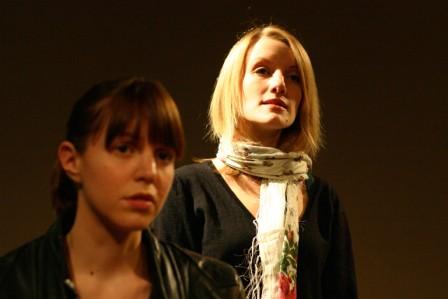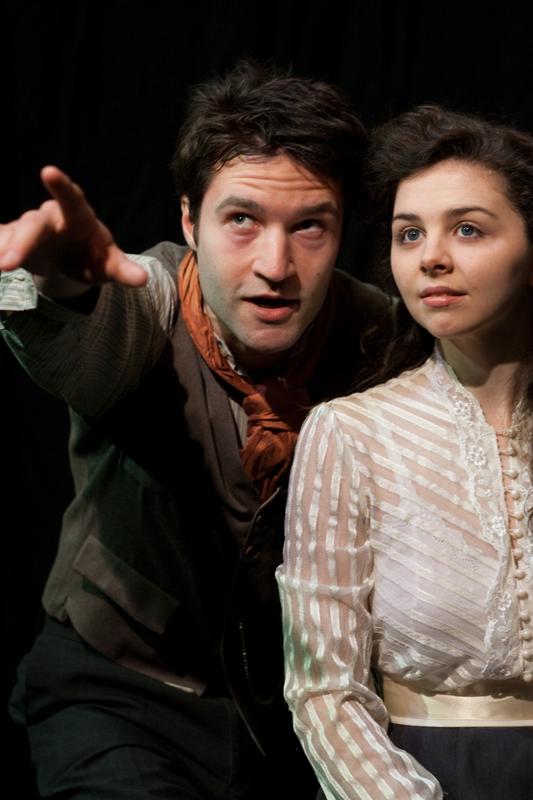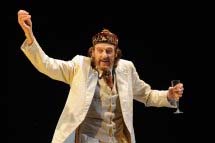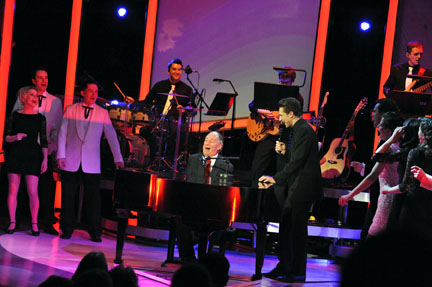Michael Morpurgo wrote Private Peaceful with a mission in mind, that was to help grant posthumous pardons to soldiers shot in the First World War for cowardice; this was, happily, realised in 2006. In Simon Reade’s adaptation the character Private Peaceful too has a mission; to ‘set the record straight’ with regard to his conviction for cowardice. In a play lasting 80 minutes, he does just that – the performance lasts only slightly longer than the court martial that has convicted him.
The stage is set without any trappings, just a young man curled up on an old iron bedstead in a barn, awaiting execution by a firing squad. The young man is Private ‘Tommo’ Peaceful, and the play keeps returning to this location as his pocket watch “slowly slides away the seconds” towards the final moments of his life. We experience flashes of his life as Tommo’s story gradually unfolds during the course of the play. There is an inevitability about the structure of the narrative but the trick that is so successfully pulled off is to make the audience care intensely about Tommo’s journey.
Mark Quartley, an outstanding young actor at the start of his career, takes on the role of Private Peaceful, and he creates a touching and affecting portrait. During the course of the play he is called upon to create a battalionful of other characters that populate the stage in Tommo’s journey from Devon to the Western front. The performance is energetic, with clear and precise transformations from one character to another, as Quartley effortlessly becomes a young wide eyed-child, a colonel, a schoolteacher and even a cantankerous old woman urging Tommo to join up for the army well before he’s reached the proper age. He has an impressive physical presence and a vocal precision that creates and maintains the audience’s attention. Sound and lighting carefully enhance the simplicity of the play; they are both judiciously used to indicate mood and location. As the play reaches its conclusions key moments are dramatically staged, slow motion is used highly effectively to illustrate the pain of the battlefield and the worthlessness of human life on the Western Front.
The narrative is full of carefully woven images that trace Tommo as he grows from a young child in an Edwardian country idyll to the final moments of his life. The mud that young Tommo feels between his toes as a child when he walks excitedly through a stream becomes the gooey mud that “wants to drown you” in the trenches. The thrill of seeing his first aeroplane cutting its way through the Devon sky becomes the smoke-trail of a Royal Flying Corp biplane plunging to the ground over Belgium. The images that are evoked at the start of the play turn to dust as the horrors of war overcome Tommo and his brother Charlie.
Simon Reade’s adaptation makes no concessions to children regarding the reality of the battlefield and it has real bite; for the adult it has the simplicity and punch of a well-told parable. However, there is also a lightness of touch that allows the audience to laugh at the world through Tommo’s eyes, even in extremis.
Michael Morpurgo’s books about the First World War and its effect on the individual have reached an entire generation of children and their influence grows. As the lavish stage adaptation of War Horse continues to run in the West End and the publicity machine cranks up for Spielberg’s adaptation of it for the big screen, Private Peaceful quietly begins its national tour at Greenwich Theatre. It is worth noting how effective a one man show can be; it is startlingly simple, and surprisingly effective.
Private Peaceful is on at Greenwich Theatre until Sat 29th January.



 A small theatre space (and Greenwich Playhouse is truly tiny) has the effect of placing actors under intense scrutiny. Sometimes that enables the audience to understand and clarify the detail, and sometimes it means you can’t see the cherry orchard for the trees. Galleon Theatre’s production of Chekhov’s play at the Greenwich Playhouse falls into the latter category. There are some good performances that explore Chekhov’s characters, and there are moments when the power of the language and imagery are vivid – but some larger flaws in Bruce Jamieson’s production overshadow these positives.
A small theatre space (and Greenwich Playhouse is truly tiny) has the effect of placing actors under intense scrutiny. Sometimes that enables the audience to understand and clarify the detail, and sometimes it means you can’t see the cherry orchard for the trees. Galleon Theatre’s production of Chekhov’s play at the Greenwich Playhouse falls into the latter category. There are some good performances that explore Chekhov’s characters, and there are moments when the power of the language and imagery are vivid – but some larger flaws in Bruce Jamieson’s production overshadow these positives.

